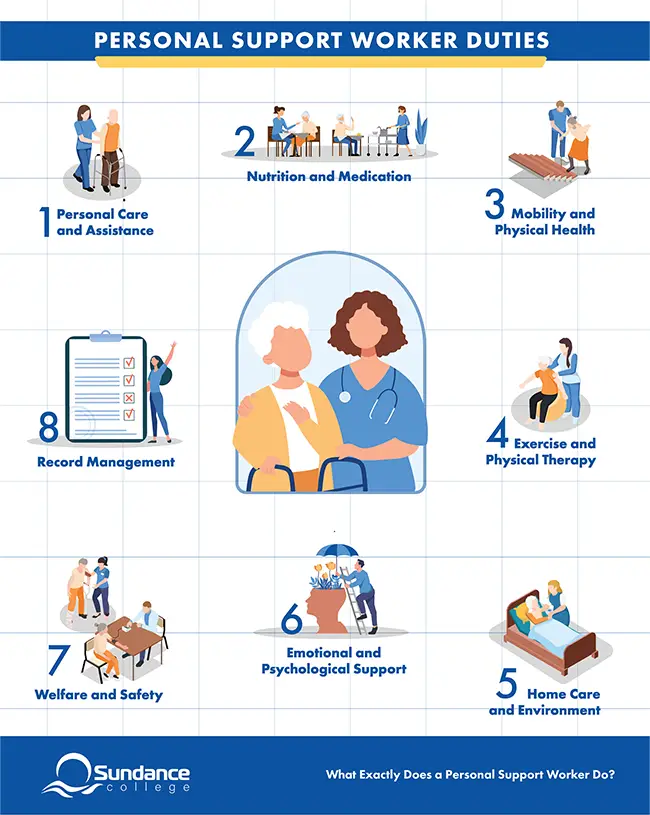Blog / What Exactly Does a Personal Support Worker Do?
What Exactly Does a Personal Support Worker Do?

Personal Support Worker Diploma
- Personal Aide - Home Support
- Family Caregiver
- Personal Support Worker
- Home Support Worker
Table of Contents
Personal Support Workers (PSWs) are integral to the healthcare system, providing essential care and support to people who face challenges due to aging, disabilities, or illnesses. These dedicated professionals play a pivotal role in enhancing the quality of life for their clients, ensuring their comfort, safety, and as much independence as possible.
PSWs carry out a multitude of hands-on duties on a daily basis, requiring not just a set of practical skills but a deep commitment to the well-being of those under their care.
This article provides a comprehensive overview of the role and responsibilities of a PSW, highlighting their importance across various care settings and the unique challenges they face.
Diverse Duties of PSWs

PSWs are tasked with a variety of responsibilities that are crucial for the well-being of their clients. They are often the primary caregivers for individuals who require assistance with daily activities, making their role indispensable in the healthcare industry.
Personal Care and Assistance
At the forefront of their duties, PSWs provide personal care and assistance. This includes helping clients with personal hygiene tasks like bathing, grooming, and dressing, which are essential for maintaining the dignity and self-esteem of those in their care. PSWs are trained to deliver these services with utmost respect and sensitivity, acknowledging the vulnerability of their clients.
Nutritional Support and Medication Management
Ensuring clients receive proper nutrition is another critical responsibility. PSWs manage meal preparation and feeding, adapting meals to meet specific dietary needs and preferences. Although they do not administer medication, they play a vital role in medication reminders, helping clients maintain their health and wellness regimes.
Mobility and Physical Health
Mobility support involves assisting clients with movement, whether it’s aiding in walking, transferring from bed to chair, or facilitating prescribed exercises. This support is crucial for preventing falls, maintaining muscle strength, and enhancing mobility, contributing significantly to the physical well-being of clients.

Exercise and Physical Therapy Assistance
PSWs assist clients with exercises prescribed by healthcare professionals, supporting physical rehabilitation and preventing further decline in function. This assistance can range from gentle stretching to more structured exercise routines, depending on the client’s condition and capabilities. By providing motivation and physical support, PSWs help clients achieve their mobility goals, contributing significantly to their overall well-being and independence.
Emotional and Psychological Support
Beyond physical care, PSWs provide companionship, offering emotional support and engaging in social activities with clients. This aspect of their work is vital for mental health, combating loneliness, and ensuring clients feel valued and connected. The connections they form with their clients are some of the reasons PSWs choose their line of work.
Emotional and psychological support is a key component of the holistic care provided by PSWs. Recognizing that health encompasses both physical and mental well-being, PSWs offer support, companionship, and a listening ear to clients dealing with emotional distress, loneliness, or the psychological impacts of illness and aging.
This support can significantly improve clients’ mental health, enhance their quality of life, and provide a sense of belonging and connection. PSWs are trained to observe signs of emotional distress and provide appropriate interventions or referrals, highlighting the importance of their role in addressing the emotional and psychological needs of their clients.
Home Care and Environmental Management
In addition to personal care, PSWs are responsible for light housekeeping, maintaining a clean and safe living environment for their clients. This includes tasks such as cleaning, doing laundry, and ensuring the home is free of hazards, which is essential for the overall well-being and comfort of those in their care.
Welfare and Safety Assurance
The family and friends of clients entrust PSWs with the safety of their loved one. Personal Support Workers are expected to follow health and safety standards, and to be aware of any hazards or dangers that may compromise the health and safety of their clients.
Record Management
A Personal Support Worker is in a unique position in the healthcare industry because they spend a lot of one-on-one time with their clients. This means that they get to know each individual on a personal level and will often be the first to notice changes in their clients. PSWs are required to keep detailed records each day and report any changes in demeanor or mobility to their co-workers to ensure the wellness of their client.
Adapting Care Across Settings

PSWs offer their services in a variety of settings, from private homes to hospitals to long-term care facilities and more. Each requires specialized care approaches.
In-Home Healthcare Services
In private residences, PSWs provide home healthcare services, tailoring their care to enhance the client’s quality of life within their own home. From elderly care to dementia care, PSWs adapt their approach to meet the unique needs of each client, ensuring personalized care that respects the client’s independence and preferences.
Support in Hospital and Acute Care
In hospital settings, PSWs support the clinical team by providing basic care and assistance. They play a critical role in the recovery process, offering mobility support as well as emotional and psychological support to patients, aiding in their rehabilitation and ensuring a comforting presence during hospital stays.
Long-Term Care and Assisted Living
Within long-term care and assisted living facilities, PSWs focus on providing ongoing support to residents. Their roles focus on Activities of Daily Living (ADLs) Support, engaging residents in social activities, and working collaboratively with healthcare teams to ensure care plans meet the evolving needs of each resident. They play a key role in fostering community among residents through socialization and participation in facility-wide activities.
Patient Advocacy
Patient advocacy is a vital responsibility of PSWs, especially when serving clients in hospital or long-term care settings. PSWs often see their clients more than any other member of the healthcare team, and sometimes even more than family members and friends.
They act as a voice for their clients, ensuring their preferences and needs are heard and respected by the broader healthcare team. This includes communicating with doctors and nurses about the client’s condition, preferences for care, and any concerns that arise. By advocating for their clients, PSWs play an essential role in the decision-making process, ensuring that care plans are client-centered and that individuals receive the compassionate care they deserve.
Respite Care
Respite Care is an essential service provided by PSWs, offering temporary relief to family caregivers from the physical and emotional demands of caring for a loved one. This service allows family caregivers to take a break, recharge, or attend to other responsibilities, knowing that their loved one is in safe and competent hands. Respite care can be provided in the client’s home or in a facility, depending on the needs and preferences of the client and their family. By providing respite care, PSWs contribute to the sustainability of home-based care and support the well-being of both clients and their families.
The Versatility of PSWs

PSWs face numerous challenges in their day-to-day work, including managing the emotional and physical demands of caregiving. They demonstrate remarkable resilience and adaptability, and use their problem-solving skills to overcome obstacles and provide the best possible care to their clients.
Their work takes a lot of emotional energy, yet they consistently provide steady support, showing how much their work really matters to the people they look after.
What Does a Typical Day for a PSW Look Like?
In every setting, a Personal Support Worker will develop a routine based around the needs of their clients and their individual duties. While routines may differ between schedules, locations, and job titles, a typical day for a PSW will look like this:
- Early Starts: PSWs should expect to wake up early in the morning to get a head start on their day and be ready to assist clients with their morning routines. Mornings can often be the busiest part of the day for Personal Support Workers as they help with personal care needs, meal and medication preparation, and household tasks.
- Client Activities: Whether working in a nursing home, care facility, or travelling to clients’ homes, PSWs will spend most of their day assisting with the physical, social, and mental activities that keep clients happy, healthy, and independent. These activities can include having a chat, driving to bingo, mobility and fitness therapy, and anything in between.
- Meal Preparation: Throughout the day, it is often the responsibility of a PSW to plan and prepare meals for their clients, considering any dietary and physical restrictions.
- Observation and Reporting: PSWs spend a lot of time with their clients and are often the first to notice changes in their personality, mobility, and demeanor. As someone in this unique position, it is up to the PSW to document and report any issues or opportunities they see in their clients throughout the day.
- Leaving Each Client Happy: Every client will have unique needs and require various levels of care each day. Once a PSW’s shift is over for the day, clients may be visited or looked after by another health professional or their loved ones. It is important that the client is satisfied and happy with their day, and that the following carer is kept up to date with any changes.
A stable and reliable routine is important when working with clients who require daily assistance. It helps them to feel secure and reassures their families and friends that they are being well taken care of.

The Indispensable Nature of PSWs
Personal Support Workers play a critical role in the healthcare system, providing essential services that enhance the quality of life for individuals across various settings. Their dedication to offering personalized, compassionate care is fundamental to the well-being of countless individuals, making their contributions invaluable. As the healthcare landscape evolves, the importance of PSWs will undoubtedly grow, reflecting their essential role in caring for the most vulnerable members of our society.
Is a Career as a Personal Support Worker Right for You?
Wondering if this career path is right for you? Take our Career Readiness Quiz. It’s designed to help you understand if this fulfilling career aligns with your passions and aspirations.
To learn more about the role of a Personal Support Worker and how you could become one in under a year, reach out to an admissions advisor to get started.
Related Blogs
Subscribe for more career advice
Blog Categories
Share on:
